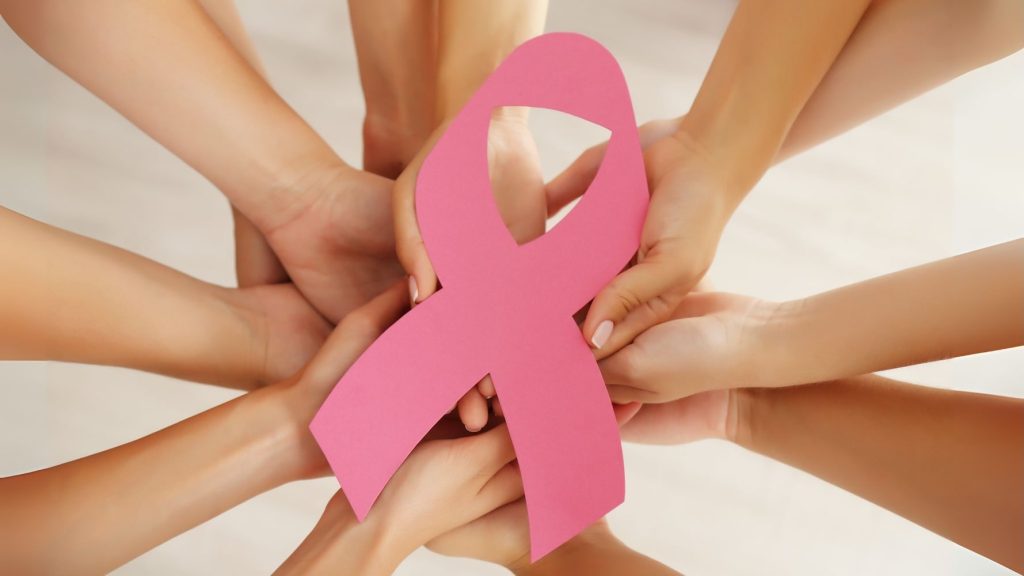Breast pain is a common concern that many women experience at various stages of their lives. While it can be alarming, especially when linked to fears of breast cancer, it’s important to know that causes of breast pain are often benign.
Understanding the types and triggers of breast pain can help in identifying the right breast pain relief methods and knowing when to seek medical advice.
Who Is Most Likely to Experience Breast Pain

Breast pain can be categorised into two main types.
- Hormonal breast pain occurs in a predictable pattern with the menstrual cycle, often worsening before your period and subsiding afterward.
- Non-cyclical breast pain may not follow a set pattern and can be due to various factors such as injury, infections, or other breast-related conditions.
Women going through hormonal changes, such as those in their reproductive years, pregnancy, or menopause, experience cyclical breast pain. This is due to fluctuating estrogen and progesterone, causing the breasts to feel tender or sore.
Young women and those on hormone replacement therapy (HRT) may also experience breast pain. Lifestyle factors, such as high caffeine intake or stress, can exacerbate symptoms.
If you’re noticing consistent or worsening pain, especially if it’s localised to one area, it’s important to consult with our breast speccialist to rule out any underlying conditions.
What Are the Common Causes of Breast Pain

Several causes of breast pain can range from benign to more serious conditions. Some of the common causes include:
- Hormonal changes: Fluctuating hormone levels are a major contributor to hormonal breast pain, especially during the menstrual cycle, pregnancy, or menopause.
- Infections or inflammation: Conditions like mastitis, which commonly affects breastfeeding women, can cause pain and discomfort.
- Breast cysts: These fluid-filled sacs in the breast tissue can cause tenderness or pain.
- Breast injury: Trauma to the breast, such as a hit or bruise, can lead to lingering pain.
- Fibrocystic breast changes: These are non-cancerous changes that make the breast tissue lumpy or rope-like, often causing pain.
- Medications: Certain drugs, including hormone therapy, may lead to breast pain as a side effect.
How to Relieve Breast Pain
Finding effective breast pain relief depends on the underlying cause of the discomfort.
Over-the-counter pain relief: Medications like ibuprofen or acetaminophen can help alleviate pain and reduce inflammation.
Warm or cold compresses: Applying warmth or cold to the affected area can soothe sore muscles and reduce tenderness.
Supportive bras: Wearing a well-fitting, supportive bra can minimise breast movement and provide relief from pain.
Dietary adjustments: Reducing caffeine, salt and fat intake may help manage cyclical breast pain.
Relaxation techniques: Managing stress through relaxation techniques like deep breathing or yoga can reduce pain linked to tension.
While these methods can help with breast pain relief, it’s important to monitor your symptoms and consult with our breast specialist, Dr Andrew Lee, if the pain persists or worsens.
Our doctor is committed to providing compassionate and comprehensive breast care. As a breast surgeon with experience in oncoplastic breast surgery, Dr. Lee offers a patient-centered approach to managing causes of breast pain. His international training and experience allows him to tailor treatment plans that address both the physical and emotional aspects of breast pain, helping women feel reassured and supported.
With advanced training in the UK and a dedication to ongoing research, Dr Andrew Lee is well-equipped to evaluate breast pain and guide you through the necessary steps. Whether it’s through diagnostic evaluations or personalised treatment plans, he ensures that his patients are informed, comfortable and confident in their care journey.
If you’re experiencing breast pain or have concerns about your breast health, we are here to help you navigate your journey with empathy and compassion.
When Should You See Our Breast Specialist

Breast pain is usually not a cause for concern. The following are instances when you should seek medical advice.
- Persistent pain in one spot
- A lump that doesn’t go away after your period
- Redness or warmth in the breast
- Nipple discharge unrelated to breastfeeding
- Pain that interferes with daily activities
These could be signs of an underlying condition that needs further investigation. Regular check-ups with a healthcare professional can help keep your breast health in check and ensure that any potential issues are caught early.
Key Takeaways: Find Relief and Peace of Mind with Personalised Care

Understanding the causes of breast pain and seeking effective breast pain relief is crucial for your overall well-being. Whether dealing with hormonal breast pain or cyclical breast pain, early intervention is key to managing discomfort and ensuring overall well-being.
Dr Andrew Lee at the International Specialists Clinic understands the physical and emotional impact of breast pain. With a patient-first approach, Dr Andrew Lee guides patients with precision and empathy, ensuring that your health journey is as smooth and supported as possible.
Feel confident in your care and find peace of mind at the International Specialists Clinic.
Why Awareness of Rare Symptoms is Crucial

Early detection of breast cancer improves treatment outcomes. While common symptoms are widely known, awareness of rare symptoms of breast cancer can ensure that no signs go unnoticed. Ignoring these uncommon symptoms can lead to delayed diagnosis and more advanced stages of cancer. Understanding these rare signs can empower individuals to take proactive steps in monitoring their breast health.
Early diagnosis of breast cancer through awareness of these rare symptoms can lead to more effective and less invasive treatment options. Regular self-examinations and being attuned to your body’s changes play a critical role in early detection. Additionally, communicating any concerns or unusual findings with your breast doctor can expedite the diagnostic process.
When to Seek Medical Attention: Questions to Consider Asking Your Breast Specialist
Knowing when to seek medical attention is crucial for timely intervention. If you experience any of the rare symptoms of breast cancer mentioned, or if something doesn’t feel right, don’t hesitate to consult a breast specialist. Early detection and prompt action are key to successful treatment.
Here are questions to consider asking your breast specialist:
- Can you explain the different stages of breast cancer and how they might relate to the symptoms I am experiencing?
- What lifestyle changes can I make to reduce my risk of developing breast cancer?
- How can I effectively monitor my breast health at home between professional screenings?
- Are there any genetic tests available that can help assess my risk for breast cancer?
- What should I do if I notice changes or symptoms that are not typically associated with breast cancer?
At Andrew Lee Breast Clinic, we are dedicated to providing you with the information and care you need to address any concerns you may have about breast pain and rare symptoms of breast cancer.
Choose Compassionate Breast Care for Your Symptoms
Recognising rare symptoms of breast cancer is essential for early detection and effective treatment. By staying informed and vigilant, you can take proactive steps to monitor your breast health. At Andrew Lee Breast Clinic, we are committed to providing compassionate care and evidence-based guidance. Our team is here to help you with personalised consultations and diagnostic tools.
If you’re experiencing any unusual breast symptoms, don’t wait. Schedule a consultation with Dr Andrew Lee today and take the first step towards peace of mind and optimal breast health.







